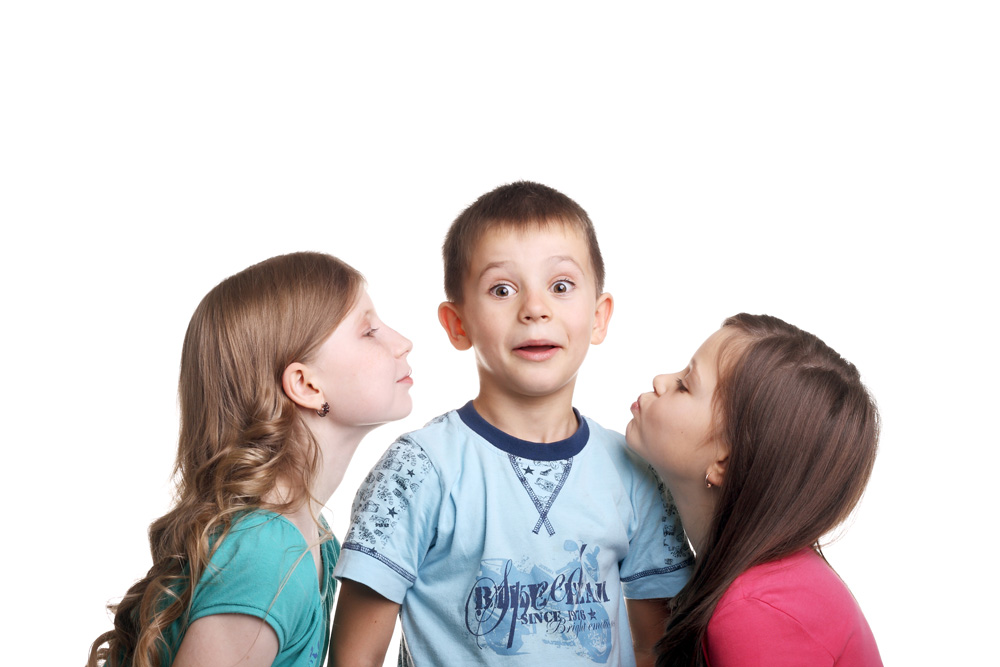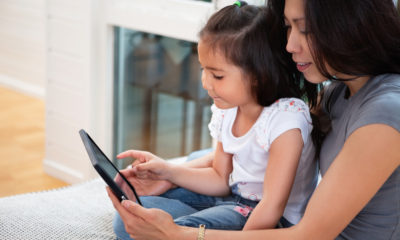Sex Ed
How to raise children without sexual shame
‘Mummy, what is a scrotum?’
If you’re a parent, then you’ll know what it’s like to be asked questions about the human body and its functions.
Depending on your own upbringing and how you were educated around sex, will determine how you feel about having those conversations.
What’s really important to understand, is how we answer those innocent questions is detrimental to our children’s wellbeing.
Talking about sex to your little munchkins is only awkward if you make it that way.
Children are not born with sexual shame, they learn it.
And they learn it from the big people who deny them the conversations and information they most want, or from the embarrassment and shame their parents display when asked questions like: ‘Where do babies come from?’
I remember asking that very question when I was a child.
I was five-years-old and my parents told me: ‘From the Victoria market’.
So you can imagine my disappointment when we visited the market that very next week and there was no baby stall in sight!
It is these little lies – that parents say with the hope of protecting their child – that cause the child to disassociate from their sexuality and take on sexual shame.
What’s wrong with this?
Children lose touch with their natural instincts.
And when this happens they become more susceptible to sexual abuse.
One in three girls will be sexually abused by the time they are 18-years-old.
Children’s bodies are less likely to be violated if they are made aware of what is healthy and what is not.
We need to be educating our children on what is and isn’t appropriate, so that our children will speak up if a boundary is overstepped.
Not speaking up is what causes the most harm, because the emotions associated with hiding sexual abuse creates shame, fear and sexual disease.
We as parents need to teach ownership and responsibility.
Let your child know that it’s NOT ok to be touched by an adult.
Let them know that if that happens, to tell you immediately.
Let them know that it’s ok for your child to explore their own body, but given the state of our society, that it is best to do it in private.
And if your child does come and tell you that someone has touched them, support them, love them, and do what’s required to have the offender removed from your child’s life.
If a child is encouraged to speak up, they will have no need to hide any kind of abuse or bullying.
So how do you have those conversations about sex?
You be honest.
Share with an open heart.
By holding back, we leave space for our children to learn an unhealthy way of being sexually active.
If we deny our children sex education and information they will find it elsewhere, from porn or the Internet.
Most of the sex education readily available teaches a very disassociated, mechanical and often degrading style of sex.
That’s why we need to get in first, so our children know that they can come to us with their questions and know they will be met with love and support and the information they require to have a healthy relationship with sex.
So at what age do you start sharing the truth about sex with your children?
As soon as they start asking questions.
Every child will mature at their own rate, and so if at 3-years-of-age your child asks you why you have hair on your genitals and they don’t, then answer them honestly.
If you are ashamed or embarrassed by your children’s questions, then this will start to seep into their subconscious programming.
The only reason sex conversations are awkward, is because we make them awkward.
If YOU have issues around your sexuality, this will be passed onto your child.
So it goes without saying that the best way to guard against your child taking on sexual shame, is to ensure YOU don’t have any sexual shame.
Children model their parents.
From the moment a child is conceived up until age seven, a child’s subconscious mind records everything they see, hear and feel.
So even if you don’t say anything bad about sex, if you yourself are sexually shutdown or have sexual hang-ups, then your child will pick up on those issues, and make them their own.
The more comfortable you get with your own sexuality, the easier you will find it to share with authenticity and honesty.
Which brings me to this all-important topic:
Calling genitals any name other than their real name is one of the most common ways parents create sexual shame.
A vagina is a vagina.
A penis is a penis.
Trying to protect our children from themselves creates more harm than good.
Nicknaming our most beautiful parts is what creates the shame and embarrassment, because what you’re essentially doing, is saying: ‘Vaginas and penises are not to be spoken about.’
These body parts are to be celebrated and the more we encourage our children to love their genitals and explore them, the less likely they are to experience sexual trauma, whether it be abuse or accepting someone into them before they are physically ready.
This is where children need to be taught to respect their bodies and value their bodies.
Children need to understand the difference between the ugly side of sexuality – abuse – and the beautiful side of sexuality, an exchange that is nourishing and full of pleasure.
For most people the only education they get about sex is:
You have a penis, it goes in the hole and the deeper and faster you go, the better. Perhaps you get warned about the potential for having babies or the dangers of ending up crabs, but it’s not often we’re given any guidance on how to achieve deep pleasure.
Sexuality is about more than this body part going there.
We are human beings with human emotions and to deny sex as an emotional practice is to shut down who we truly are.
We need to teach our children that their heart partakes in a sexual experience, and how to deal with the emotions that are activated when we connect with someone on such an intimate level.
When a child has an understanding of a healthy sexual relationship, they are less likely to get themselves into situations that will cause trauma and could leave them pregnant or with disease.
Healthy education will lead to a child respecting their body enough to be careful with it, to nurture it, and not to allow anyone to treat it as anything less than precious.
The child needs to understand the difference between doing something due to peer pressure, and doing something because they want to.
So at its core, good sex education is about teaching a person how to relate.
Relating with self, as much as relating with another.
In a world that is sex-saturated, there is this belief that bodies are sinful and need to be hidden, along with our sexual desires and feelings.
It’s been shown that children brought up in nudist families have a healthier relationship with their body and their sexuality.
Raising children without sexual shame is vital for your child’s emotional and physical long-term health.
Statistically if you look in the world where good sex education is offered, there are less teenage pregnancies and less STIs.
Holland is one of those prime examples.
So if nothing else, ensure you have honest human conversations.
Make sex a topic of conversation fit for the dinner table.
If everyone spoke about sex more openly, it wouldn’t be such a taboo topic, and it wouldn’t cause all the shame it currently does.
If you know other parents struggling to know how to share sex with their children, please share this post.
The more children who have a healthy relationship with sex, the less disease, unwanted pregnancy and sexual trauma there will be.
Image courtesy of Shutterstock
Have an amazing experience or tips you like to share on SimplySxy? Drop us an email at editorial@SimplySxy.com!
Tamra Mercieca is a Relationship and Self-Love Therapist, Author and founder of the school Getting Naked Pty Ltd where she teaches people how to strip off the layers of emotional conditioning so they can enjoy more love, more happiness and more pleasure in their life. It was after overcoming severe clinical depression and a number of life-threatening health ailments that Tamra discovered the most important relationship you will ever have, is your relationship with YOU! Using this philosophy she cleared the barriers keeping her from finding her Prince, sharing her personal experiences in her book series Getting Naked. Tamra loves teaching the art of self-love and shares this message during regular television and radio spots and in her Nature and Health magazine column. Tamra’s passion in life is to let her own love story inspire others to live their unique and magical happily right now! Visit her at: www.gettingnaked.com.au by clicking on the links below!































